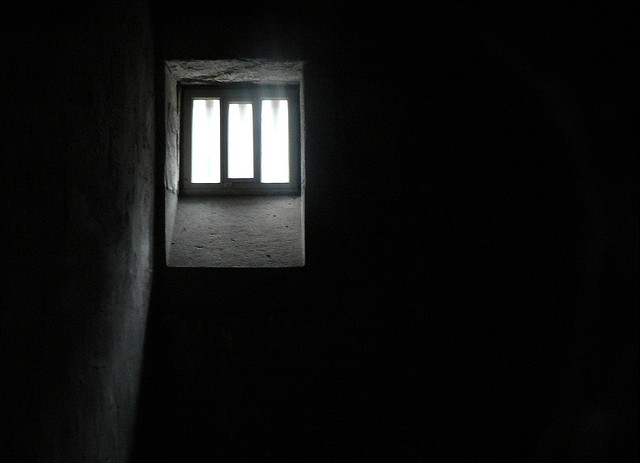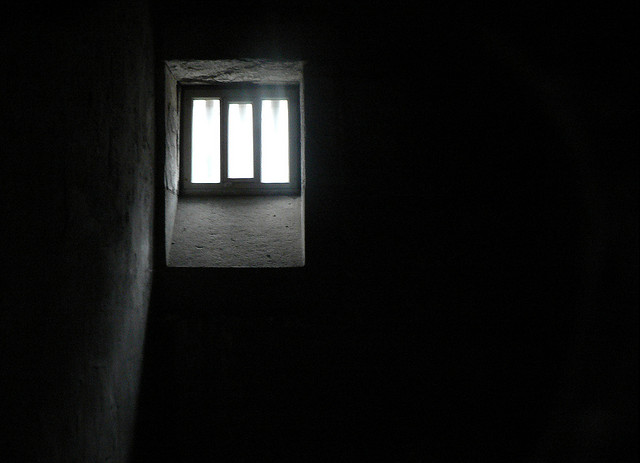[contextly_auto_sidebar]

Prison window, from Flickr, decade-null
Torture is universally held in open contempt by the UK legal system. Except, of course, in national security cases, where the evidence of UK complicity in torture overseas may be kept secret, as the High Court case of Kamoka & Ors v The Security Service & Ors [2016] EWHC 769 (QB) reveals.
The Tripoli papers
After the fall of Colonel Gaddafi in 2011, human rights researchers walked into the offices of the Libyan security services. There they found certain documents (known as ‘the Tripoli papers’), which suggested strong links between western intelligence agencies and their Libyan counterparts.
The documents detailed joint operations between the US, UK and Libya involving kidnap, extraordinary rendition and torture of a number of Libyans suspects, including a woman who was four and-a-half months pregnant.
The High Court judgment in Kamoka has now confirmed that although judges have known about the Tripoli papers for over a decade, the evidence remained secret.
To understand this decision, it helps to rewind to the early noughties. For several decades, Libya had been an international pariah, tainted by the Lockerbie bombing, the murder of PC Yvonne Fletcher and other diplomatic incidents.
Everything changed after 9/11. The UK government rekindled its relationship with the Gaddafi regime. In exchange for Libya’s cooperation in the ‘War on Terror’ and disposing of its weapons of mass destruction, UK companies, such as BP, were granted greater access to Libyan oil and gas reserves and other investment opportunities. This was the political backcloth to Tony Blair’s infamous ‘kiss in the tent’ with Colonel Gaddafi.
As our foreign policy on Libya shifted, the UK became less of a safe haven for Gaddafi’s opponents. By 2006, a number of Libyans in the UK had been arrested and charged with terrorism offences linked to the Libyan Islamic Fighting Group (LIFG).
The UK decided to deport them to Libya. They were detained pending deportation and subjected to Control Orders that restricted their liberty.
Kamoka
The claimants brought claims for false imprisonment and misfeasance in public office against MI5, MI6, the Attorney General, the Foreign and Commonwealth Office and the Home Office. The issue was whether the government had wrongly suppressed the Tripoli papers at earlier hearings in Special Immigration Appeals Commission (SIAC) in 2006 and/or the High Court. The government agencies asked the court to strike out the claims on the ground that no suppression had taken place and all the evidence had already been considered by SIAC and/or the High Court.
Mr Justice Irwin found that there was no suppression of evidence. The second claimant had argued before SIAC that it was unsafe to rely on intelligence obtained from detainees in Libya due to widespread concerns about torture and the likelihood that he would be at real risk of torture if deported. The claimants, and the Special Advocates representing their interests, were therefore alive to the issues of rendition, evidence obtained by torture and cooperation between western intelligence agencies and the Libyan authorities. Despite this, the Special Advocates did not argue that the government’s case was hopeless or that it was acting in bad faith. SIAC and the High Court considered the matter fully and decided the case on material other than evidence that may have been obtained by torture.
With only a few exceptions, the claimants claims fell to be struck out as an abuse of process because if they were allowed to proceed, they would be challenging earlier judgments in which all the evidence had been fully heard.
Questions unanswered
Senior judges knew that the UK was secretly aiding and abetting the Libyan authorities in kidnapping, detention and torture. They said nothing about this in their open judgments at the time. We do not know what their closed judgments said on this issue, if anything.
If the Libyan security service had destroyed the paperwork before their offices were searched, this particular episode in the ‘War on Terror’ may never have come to light.
This decision raises some fundamental issues about trust and confidence in the UK justice system and its ability or willingness to hold governments to account. After all, Judges are required not only to determine cases but to uphold the rule of law and be seen doing so.
Questions also arise about the procedure:
- What public interest is served by keeping such information secret?
- What are the duties on judges who learn in secret hearings that the UK government has violated international law?
- How can such issues be adequately addressed in a closed hearing?
- Could evidence of the UK’s involvement in torture justify full or greater disclosure of such material, in the public interest?
- How can the common law duty of anxious scrutiny be given full effect in such cases without disclosure?
- To what extent should a judge (and government agencies) inquire into any actual or alleged UK involvement in torture if relevant to the case?
The open judgment in Kamoka does not answer these questions. The decision notes that it is not the role of the Special Advocate to share closed evidence that may give rise to a further legal claim by a Claimant (see paragraph 32). This is unlikely to be the last word on the topic.
Even within the practical constraints imposed by national security cases, it is widely accepted that secret hearings are inherently unfair. Special Advocates and some Judges have deep misgivings about the process.
What is striking about Kamoka is its confirmation that the current system appears to give the UK government a license to involve itself in torture with effective impunity, free from public scrutiny and condemnation.






